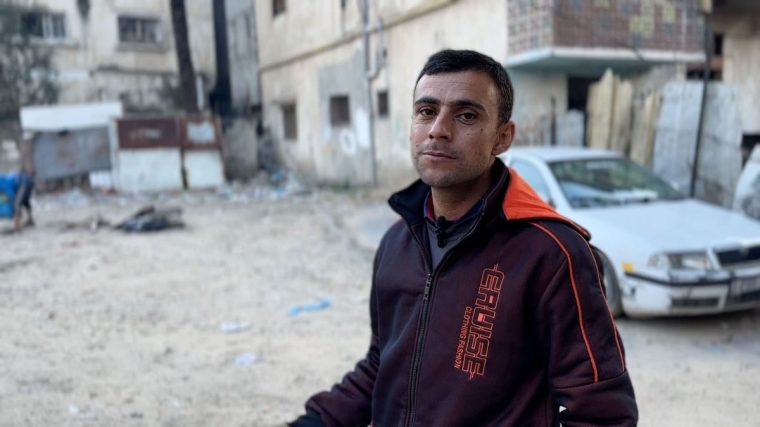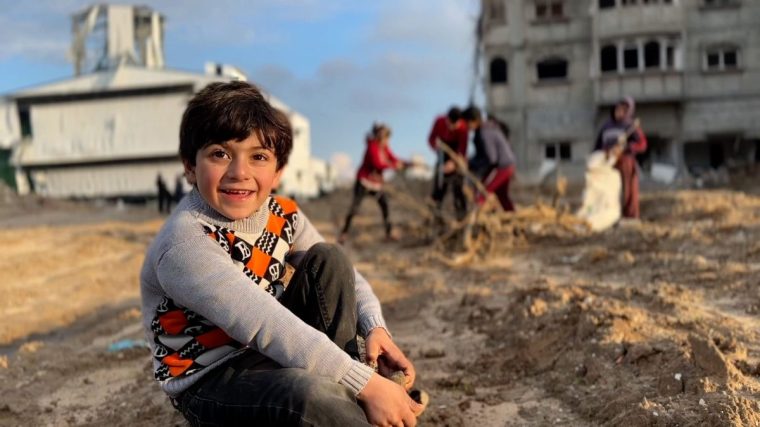In Life and Death in Gaza, the latest documentary in the BBC’s Storyville series, people were constantly looking up. They watched rockets flare and squinted at planes, some dropping bombs, others leaflets. They followed aid packages, floating serenely on parachutes through bright blue skies. Standing on land they had been told they must leave, they were at the mercy of what rained down from above. At a camp in Rafah, 23-year-old Aya sighed: “We’ll get up and start the suffering; the day is young”.
Self-filmed by ordinary Gazans in the year since the 7 October attacks by Hamas prompted an immediate Israeli military response, Life and Death in Gaza was an essential account from civilian Palestinian voices. The 90-minute film eschewed political context and commentary in favour of first hand insight, following four civilians as they navigated the impossible and inhuman: daily bombing raids, constant evacuations, endless shortages of food, medicine and fuel, and the dwindling of hope
There was Aya, a law graduate whose plans to study abroad were on hold as she found herself repeatedly displaced, and Khalid, a 36-year-old father of five and award-winning physiotherapist, now volunteering with paramedics. Youth worker Adam was desperately seeking passage to Egypt with his younger sisters after the death of their father from Parkinson’s. Finally, there was Aseel, heavily pregnant with her second daughter and trying to care for her toddler, Rose, while her husband Ibrahim worked as a press photographer.

This was a portrait of extraordinary human resilience in the face of realities far worse than nightmares. As Aya interviewed two giggling young girls, the camera shook and the screaming began: there had been a nearby missile hit. Khalid watched horrified as his young children played at “rescuing” each other from bomb-sites, while Aseel and Ibrahim embarked on a frantic search of stricken hospitals for antibiotics for their new baby Hayat (which means “life” in Arabic), whose tiny lungs were wheezing with infection. Through it all, they recorded what was happening as proof of what they themselves could barely believe was unfolding before their eyes.
As the rest of the world angrily debates the politics of this place, Life and Death in Gaza showed that the people living there do not have that luxury: no one mentioned Hamas nor Israel in the film, beyond the “they” who drop bombs. They were too busy saying goodbye to their children every night in case they didn’t wake up the next morning. They were merely trying to survive with some semblance of themselves still intact.
There was a sense among the Gazan contributors that the world does not really know what is happening there: “No one cares about us,” said Aya. According to Reporters Without Borders, more than 130 Palestinian journalists have been killed by Israeli forces while the region remains closed to almost all foreign reporters and plagued by communication blackouts.

But as bodies and buildings are ripped apart, it is not only lives that are extinguished but loves, legacies, memories and ambitions – a total erasure of personhood. Harrowing as this footage was, it was also just a tiny snapshot of the horror: people are dying at such a rate in Gaza (over 42,000 so far) that we will likely never know all their stories or even all their names. This documentary was an attempt to bring a human shape to horrifying statistics and it was devastating and shameful to behold what the international community is both allowing and assisting to take place.
The film’s final captions told us that a year since they started filming, Adam has made it to Cairo but Aya, Khalid, Aseel and their families are still in Gaza, desperately searching for a sliver of their homeland the bombs cannot reach. They are still alive – for now.
‘Life and Death in Gaza’ is streaming on BBC iPlayer

